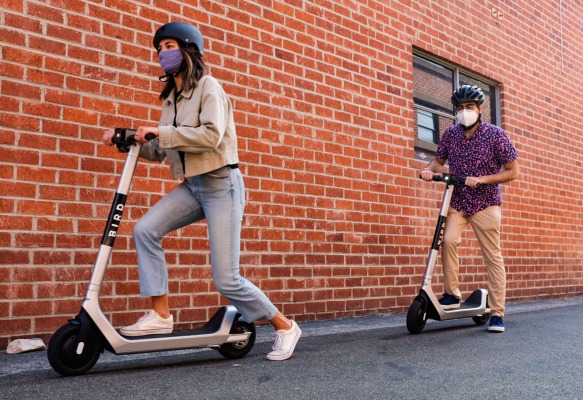Bird presented its first quarter 2022 earnings on Monday after the bell.
Revenue has decreased consistently since the company went public via a special purpose acquisition merger in November last year. As a result, Bird is looking at streamlining resources so it can achieve profitability this year. Bird’s initiatives involve focusing on its most profitable markets, potentially pulling out of less profitable markets and slowing the expansion of vehicle sales, like the e-bike the company launched last summer or the retail scooters launched in December.
Bird shares fell 7.4% Monday, but then took an abrupt turn in after-market trading, shooting up more than 36.5%.
Financials
Bird’s first quarter pulled in revenue of $38 million, which the company says is up 48% year-over-year. However, quarter-over-quarter, revenue is down from $54 million in the fourth quarter of 2021 and represents a continued decrease in revenue over the last three quarters – in Q3 2021, when Bird first began reporting earnings publicly, the company closed out the quarter with $65.4 million. Despite this downward trend QoQ, Bird beat its own revenue expectations of between $34 million and $36 million, as well as Wall Street expectations of $35.7 million.
Gross margins and ride profit were also down this quarter, at 9% compared to 15% last quarter and $13 million compared to $23.8 million last quarter, respectively. YoY, gross margin grew one percentage point, but ride profit grew 72% compared to $7.6 million in the first quarter of 2021.
Bird managed to show a net income of $10.4 million, compared to a net loss in the fourth quarter of 2021 of $39.6 million. This is primarily attributable to $140.1 million of income that came from senior preferred stock financing, the business combination with Switchback Corporation II and its private investment in public equity financing. While this shows up as an income on the balance sheet, it’s not considered cash to be used by the company.
During Bird’s earnings call on Monday, CEO Travis VanderZanden said performance early in the quarter was impacted by bad weather (which is always the case during the end and beginning of the year) and a surge in Omicron cases. This manifests on the balance sheet as fewer rides in Q1, at 7.3 million, down from 9.4 million last quarter, and fewer average rides per day per scooter.
Similar to last quarter, shared rides made up the majority of Bird’s revenue, with scooter and bike sales taking only a sliver of the pie. In fact, quarter-over-quarter, revenue from sales decreased from around $9 million to $4 million, which might be part of the reason the company is pulling back from the retail portion of its business.
In terms of other operating expenses, the first quarter saw Bird spend close to $85 million on general and administrative costs, which includes a stock-based compensation expense of $44.7 million. This, along with other expenses, left Bird at an operating loss of almost $97 million.
The company closed out the quarter with $35 million in cash.
Bird’s revised guidance
It’s clear the continued unpredictability of the pandemic and other headwinds has sobered Bird in terms of full-year revenue projections. The company provided updated guidance, expecting revenue for the fiscal year 2022 to be between $275 million and $325 million. At the end of 2021, Bird expected full-year revenue to be at least $350 million.
Despite the tough start to the year, the company is expecting ridership to pick up based on “a significant increase in demand beginning in early March as macro headwinds eased, weather improved and consumers turned to transportation alternatives such as Bird in light of higher gas prices,” said VanderZanden.
“With that said, the softness early in the quarter resulted in lower utilization year-over-year, which negatively impacted adjusted EBITDA for the period,” continued the CEO.
VanderZanden said Bird expects to deliver its first quarter of positive adjusted EBITDA in the third quarter of this year, and its first full year positive adjusted EBITDA in 2023. The company is aiming for $80 million in annual run-rate cost savings for 2022, resulting in an annual adjusted operating expense run-rate of no more than $160 million.
“We have already received the vast majority of the vehicles we intend to deploy in 2022,” said Yibo Ling, Bird’s chief financial officer. “As such, we believe we’re well positioned with our vehicle deliveries for the balance of ’22 and will maintain a disciplined approach to vehicle allocation.”
To get on the path to profitability, Bird will be tightening its belt, dropping some dead weight and focusing on the sharing business. Or as Bird put it, the company plans to “streamline and consolidate its resourcing against its core business.”
In other words…they will likely fire a bunch of people, particularly in those markets where Bird isn’t making money or that have unfavorable regulatory environments.
Bird did not confirm whether layoffs were in the company’s future.
“We have decided to slow the expansion of our product sales portfolio offering,” said VanderZanden. “We will additionally be realigning our resources to prioritize sharing operations within our existing U.S. and EMEA regions, which have proven investment returns while taking a measured approach to further geographic expansion. And we will be open to leaving some markets that do not meet our profitability goals given current market conditions.”
This comes a little over a year after Bird promised $150 million to expand its operations in Europe.
When pressed, VanderZanden said Bird would likely focus on improving and possibly expanding its sharing business in the U.S. and Europe. If the company were to consider pulling out of certain markets, we might expect that to happen in places like Canada or the Middle East in the coming months.

